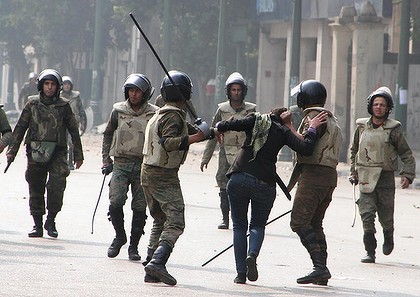IN THE MEDIA
New order, same rules
December 27, 2011 | Or Avi Guy

Or Avi-Guy
The Age – December 27, 2011
Opinion
Will the Arab revolutions bring freedom for women? So far the signs are bad.
Many women in post-revolution Egypt, Libya and Tunisia are concerned. During the Arab Spring they played a key part in the protests by taking to the streets, marching and protesting alongside men. As the old order fell, hopes for new-found freedoms and political liberties surged, and women’s rights were no exception. Yet some of the new regimes have been quick to reinforce laws and norms limiting these rights, justifying it as a return to values undermined by previous regimes.
Historically, previous revolutions in the Arab and Muslim world saw a reinstatement of traditions hindering women’s rights and inclusion in politics.
The deterioration in women’s status after the revolution in Algeria and the Iranian Islamic revolution created frightening precedents. So it is not surprising that many women in the aftermath of the Arab Spring revolutions now wonder; might this recur in Tunisia, Libya and Egypt?
Even ”liberal” Tunisia has witnessed developments that have undermined women’s participation in the new regime. Despite a promising parity ruling prior to recent elections – supported even by Islamist parties – in practice, lack of gender quotas rendered the parity law insufficient.
The interim government includes only two female ministers out of 21. Leading Islamist party al-Nahda won 41 per cent of the votes and its stance on women’s rights has been highly inconsistent.
Al-Nahda ran only two female candidates across 33 constituencies. Party leader Rachid Ghannouchi publicly supported women’s rights, even though he had previously said that ”the Tunisian woman has not yet acquired leadership status”. Al-Nahda denies it wants to monopolise power or impose a fundamentalist agenda. However, it has urged legalising polygamy in contradiction to the Personal Status Code, which guarantees the rights of Tunisian women. There have been incidents of coercing women over their dress, such as forcing female university lecturers to wear a veil.
Many Tunisian women’s rights and democracy activists fear that al-Nahda’s moderate discourse is a rhetorical tool to mask more fundamentalist Islamist views.
In Libya, the chairman of the Libyan National Transitional Council (NTC), Mustafa Abdul-Jalil worried many women with his liberation speech because he declared that Libya would be a moderate Sharia country, meaning that certain laws, such as those restricting polygamy, would be voided.
The NTC leadership, and particularly the executive committee, has expressed support for women and stated that there was ”no chance” that Libya would become a theocracy. Yet women’s participation in the political process remained insignificant under the transition authorities and only two NTC members out of 40 were women when it was formed.
In Egypt after the demise of Hosni Mubarak, the role of women in Egypt’s governance during its transition period has been limited. Women have had little representation in the major political parties and were excluded from the committee that drafted Egypt’s transitional constitutional declaration.
There is only one female minister in the cabinet of 34. The Supreme Council of the Armed Forces excluded women from provincial governor positions, removed the 64-seat parliamentary quota for women and dismantled the Ministry of Women’s Affairs.
According to the Egyptian Centre for Women’s Rights, ”The exclusion of women in Egypt turned into a systematic policy.” In addition, the victory of the Islamist Muslim Brotherhood in the parliamentary elections and the unexpected gains by the even more radical al-Nour Salafi party will influence future policy towards a more Islamist agenda.
In the continuing protests after Mubarak’s fall, there have been several incidents of harassment of women in public spaces.
In May, dozens of women demonstrating for the right to engage in Egypt’s political future were arrested and, reportedly, subjected to ”virginity tests”. Recently, thousands of Egyptian women marched in Tahrir Square to protest the military’s mistreatment of women.
The latest protest was sparked by a video that showed Egyptian police on December 17 violently stripping a female activist of her clothes, revealing her blue bra, and then proceeding to stomp on her chest and beat her while she was apparently unconscious.
In all three nations, the debate over women’s rights has created tension between traditional Islamist influences, who claim that women’s rights are a Western value that should not be imposed on the Arab or Islamic peoples, and more liberal and secularist forces calling for gender equality and women’s emancipation.
Democratisation has opened a path for Islamists to increase their political influence. There must be a fine balance between pluralism and political freedoms such as freedom of speech and the right to elect and be elected, and women’s rights. Lack of gender equality and exclusion of women might have severe consequences for the democratisation processes since women’s participation in civil society and government are key ingredients for building democratic institutions and modern economies.
Or Avi-Guy is a policy analyst at the Australia/Israel and Jewish Affairs Council.
Read more: http://www.theage.com.au/opinion/politics/new-order-same-rules-20111226-1paf2.html#ixzz1j1OEEArh
Tags: Egypt





